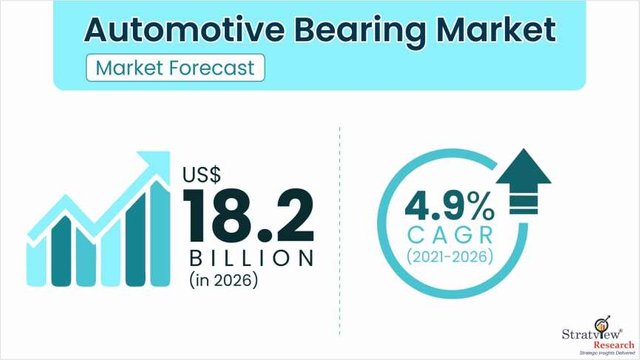Driving Efficiency: Exploring Growth Trends in the Automotive Bearing Market
The automotive bearing market is at the forefront of innovation, playing a pivotal role in enhancing vehicle performance, fuel efficiency, and durability. As the automotive industry undergoes transformative changes driven by electrification, sustainability, and advanced technologies, the demand for efficient and reliable bearings has surged. This article delves into the growth trends shaping the automotive bearing market and their implications for the future.
According to Stratview Research, the automotive bearing market was estimated at USD 12.4 billion in 2020 and is likely to grow at a CAGR of 4.9% during 2021-2026 to reach USD 18.31 billion in 2026.

The Push for Efficiency
With global emphasis on reducing carbon emissions, automotive manufacturers are striving for greater fuel efficiency and lower friction in vehicle components. Bearings, integral to reducing mechanical resistance and ensuring smooth motion, are evolving to meet these demands. Advanced materials, such as ceramic and hybrid bearings, are gaining traction due to their lightweight nature, durability, and superior performance under extreme conditions.
Electrification and its Impact
The shift toward electric vehicles (EVs) has created new challenges and opportunities for the bearing market. EVs operate at higher speeds and temperatures compared to traditional internal combustion engine vehicles, requiring specialized bearings designed for high thermal resistance and longevity. Moreover, the increasing adoption of electric powertrains has led to a growing demand for low-noise and low-vibration bearings to enhance passenger comfort.
Technological Advancements
Innovations such as smart bearings equipped with sensors are redefining the market. These bearings provide real-time data on performance metrics like temperature, load, and vibration, enabling predictive maintenance and reducing downtime. Such advancements align with the broader automotive trend toward smart, connected, and autonomous vehicles.
Regional Growth Dynamics
All regions registered massive downfalls in 2020 in the wake of the pandemic. Asia-Pacific registered the minimum loss in 2020 and is projected to maintain its lead in the global market during the forecast period. China, India, and Japan, with a majority of the world’s population, are creating a massive demand for vehicles, which, in turn, is causing a stir in the region’s automotive bearing market. The Chinese automotive industry is witnessing an advanced recovery after the strategic and efficient control of the COVID-19 outbreak. North America and Europe are also likely to bounce back, creating a healthy demand in the years to come.
Future Outlook
The global automotive bearing market is poised for significant growth, with a projected CAGR of 4.9% through 2026. Sustainability, digitalization, and electrification will remain key drivers, encouraging manufacturers to innovate and diversify their product offerings.
In conclusion, the automotive bearing market is not just adapting to industry shifts but actively driving them. With advancements in materials, technology, and design, bearings are integral to the automotive sector’s quest for efficiency and sustainability. As the market evolves, the focus will remain on delivering solutions that meet the demands of a rapidly changing landscape.